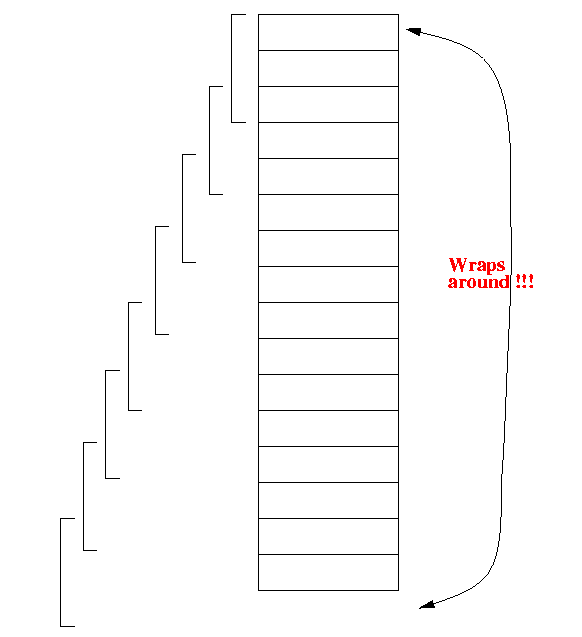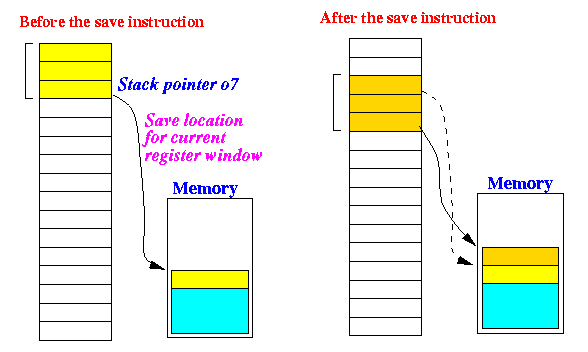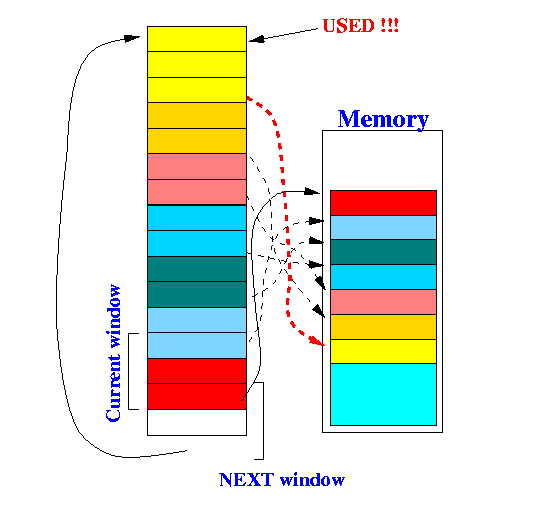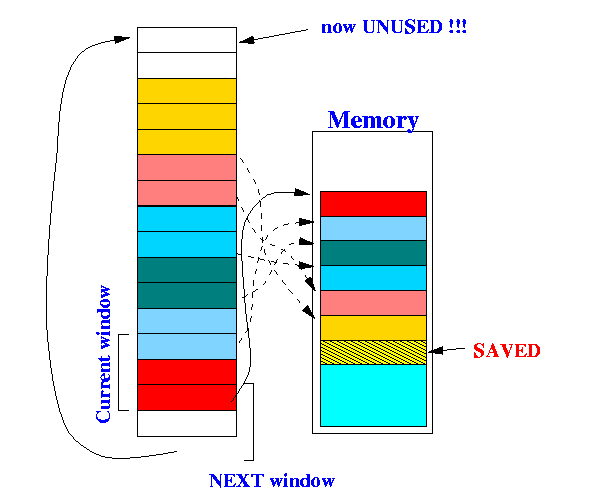- Recall that the save instruction will "create"
(i.e., reserve, use, claim,...) a new set of
input (i.e., parameters) and
local (i.e., local variables) registers.
- The SPARC CPU has 8 sets of window registers:

- Recall that we must always use the save instruction
as follows:
save %sp, -96, %spand that this instruction will decrement the stack pointer by 96 and thus reserve 96 bytes on the system stack. - This 96 bytes of reserved space is used by the
Sun's Operating System to save (24) window registers:


- When the running program executes many save instructions,
eventually, the number of unused register windows
in the SPARC CPU will be exhausted
- This event can be detected by the use of the WIM (Window Invalid Mask)
register inside the SPARC CPU.
I will not go into the details how that it is done, just
that it can be done.
When the SPARC CPU executes a save instruction and there is no more unused register windows available, the operating system will intervene.
The operating system is a program that is running inside the computer which manages the resources of the computer system - e.g., Windows 98, 2000, ME, XP,... in the Sun, the operating system is called "Solaris")
- The following is a situation where a save instruction
will cause a register window overflow, i.e.,
there is no more unused register windows available:

- When SPARC executes anonther save instruction,
the next window will occupy some registers that are already
in use (the registers rap around)
When SPARC detects this, it will use the stack pointer in the register window (shaded yellow in the figure) to find the stack segment that was reserved for saving the registers (see the red arrow)
- The result is freeing one register window (at the cost of writing
96 bytes to memory !!!)

- The result is that:
Although the SPARC CPU has only 8 sets of register windows, the Operating System can "recycle" the register windows and make it appear as it the user has a VERY LARGE set of windows
In fact, SPARC can use the entire computer memory for this "recycling" trick and you have virtually an unlimited number of register windows....
- Recall that the main difficulty in implementing recursive
functions is the NEED to "create"
(i.e., reserve memeory space for)
NEW parameter and local variables.
Recall that when we try to write recursion in M68000, we cannot pass parameters in registers because M68000 has only ONE set of registers and it was not possible for us to "create new register"
- We will only look at function where
- all parameters can be passed through the output registers in SPARC....
- the number of local variables used in the function is can be contained in the local registers in SPARC....
- all parameters can be passed through the output registers in SPARC....
- In this case (which is quite common),
the problem of creating new parameter and local variables
can be done through the save instruction....
In fact, we have "delegated" the problem of creating new variables on the stack to the Operating System - as you have seen above, SPARC's operating system will take care of saving the window registers away for us....
-
As a result, writing recursive functions in SPARC assembler
program is no different than writing an ordinary
function.
- The program in high level language:
main: int n, r; Write("n = "); // Prompt user to enter n n = ReadInt(); // Read in number r = fac(n); Write("fac = "); WriteInt(r); int fac(int n) { int sol; if ( n == 0 ) return(1); else { sol = fac(n-1); return (n * sol); } } - Here is the SPARC assembler program: click here
- The program in high level language:
main: int n, r; Write("n = "); // Prompt user to enter n n = ReadInt(); // Read in number r = fib(n); Write("fib = "); WriteInt(r); int fib(int n) { int h1, h2; if ( n == 0 ) return(1); esle if ( n == 1 ) return(1); else { h1 = fib(n-1); h2 = fib(n-2); return (h1 + h2); } } - Here is the SPARC assembler program: click here
- The program in high level language:
main: int n; Write("Number of disks = "); // Prompt user to enter n n = ReadInt(); // Read in number hanoi(n, 1, 3); // from peg 1 to peg 3 void hanoi(int ndisks, int fromPeg, int toPeg) { int helpPeg; if (ndisks == 1) then WriteLn "move disk from peg " + fromPeg + " to " + " + toPeg else { helpPeg := 6 - fromPeg - toPeg; hanoi(ndisks-1, fromPeg, helpPeg); WriteLn "move disk from peg " + fromPeg + " to " + " + toPeg hanoi(ndisks-1, helpPeg, toPeg); } } - Here is the SPARC assembler program: click here
- The program in high level language:
class List { int value; List next; } main: int n; List head; // Start of list List ptr; // Points to new list element head = NULL; while(TRUE) { Write("Enter number: "); // Prompt user to enter n n = ReadInt(); // Read in number ptr = malloc(8); ptr.value = n; head = Insert(head, ptr); PrintList(head); } List Insert(List head, List elem) { List help; if head == null) { // Base case elem.next = null; return(elem); // New head } else { // Recursion help = Insert(head.next, elem); // Insert elem in shorter list head.next = help; // Link return list AFTER // the first elem in orig. list return(head); // head is unchanged } } - Here is the SPARC assembler program: click here